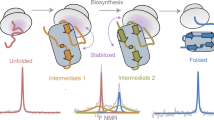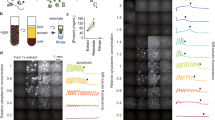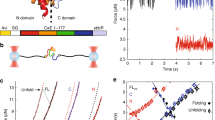Abstract
HAEMOGLOBIN is composed of equimolar amounts of α and β chains. Although it is not essential to synthesize the same number of molecules of each chain, this was originally thought to be the case1. The finding of a pool of α chains in rabbit reticulocytes implies that either at some stage there has been excess synthesis of α chains, or that the α chains are continually produced in excess of β chains2–4. An understanding of the mechanisms which control the balance of the synthesis of the two chains requires elucidation of the rate limiting steps in the assembly of each chain and the factors which affect those steps. We have already shown that the ribosomes which make each chain are evenly distributed on their respective mRNAs, thus demonstrating that there are no single rate limiting steps in the translation of the two chains by the ribosomes, other than in the process of initiation5. In this work we discovered that polysomes containing relatively few ribosomes carried more nascent α chains than nascent β chains, and that large polysomes carried more β chains than α chains. Here we report experiments which describe this phenomenon.
This is a preview of subscription content, access via your institution
Access options
Subscribe to this journal
Receive 51 print issues and online access
$199.00 per year
only $3.90 per issue
Buy this article
- Purchase on Springer Link
- Instant access to full article PDF
Prices may be subject to local taxes which are calculated during checkout
Similar content being viewed by others
References
Baglioni, C., Molecular Genetics (edit. by Taylor, J. H.), 1, 405 (Academic Press, New York and London, 1963).
London, I. M., Tavill, A. S., Vanderhoff, G. A., Hunt, T., and Grayzel, A. I., Develop. Biol., suppl. 1, 227 (1967).
Baglioni, C., and Campana, T., Europ. J. Biochem., 2, 450 (1967).
Shaeffer, J. R., Trostle, P. K., and Evans, R. F., Science, 158, 488 (1967).
Hunt, T., Hunter, A. R., and Munro, A. J., J. Mol. Biol., 36, 31 (1968).
Braunitzer, G., Best, J. S., Flamm, U., and Schrank, B., Hoppe-Seyl. Z., 347, 207 (1966).
von Ehrenstein, G., Cold Spring Harbor Symp. Quant. Biol., 31, 705 (1966).
Dintzis, H. M., Proc. US Nat. Acad. Sci., 47, 247 (1961).
Warner, J. R., Knopf, P. M., and Rich, A., Proc. US Nat. Acad. Sci., 49, 122 (1963).
Williamson, A. R., and Askonas, B. A., J. Mol. Biol., 23, 201 (1967).
Shapiro, A. L., Scharff, M. D., Maizel, J. V., and Uhr, J. W., Proc. US Nat. Acad. Sci., 56, 216 (1966).
Author information
Authors and Affiliations
Rights and permissions
About this article
Cite this article
HUNT, R., HUNTER, A. & MUNRO, A. Control of Haemoglobin Synthesis: a Difference in the Size of the Polysomes making α and β Chains. Nature 220, 481–483 (1968). https://doi.org/10.1038/220481a0
Received:
Revised:
Issue Date:
DOI: https://doi.org/10.1038/220481a0
This article is cited by
-
Free cytoplasmic messenger ribonucleoprotein complexes from rabbit reticulocytes
Molecular Biology Reports (1979)
-
Model for the regulation of mRNA translation applied to haemoglobin synthesis
Nature (1974)
-
Poly A Sequences at the 3′ Termini of Rabbit Globin mRNAs
Nature New Biology (1971)
Comments
By submitting a comment you agree to abide by our Terms and Community Guidelines. If you find something abusive or that does not comply with our terms or guidelines please flag it as inappropriate.



